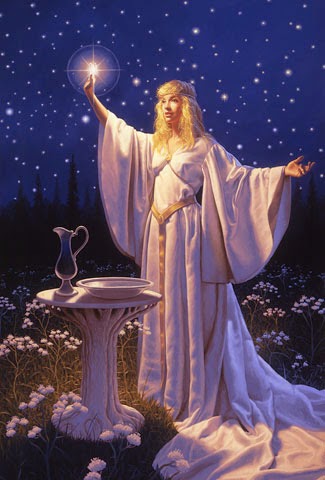Chesterton on Christmas
 |
| From the film The Nativity Story |
This is a collection of quotations from G.K.Chesterton's The Everlasting Man. In the chapter "The God in the Cave," Chesterton wrote about the uniqueness of the event in Bethlehem. Chesterton is a British writer known for his simplicity, wit and humor and for defending the Catholic faith against secular philosophies. I provided the explanatory titles below.
The Paradox of Bethlehem
A Creator unable to reach his creatures
A mass of legend and literature, which increases and will never end, has repeated and rung the changes on that single paradox; that the hands that had made the sun and stars were too small to reach the huge heads of the cattle. Upon this paradox, we might almost say upon this jest, all the literature of our faith is founded.
The Child and the Strength that sustains the stars
Any agnostic or atheist whose childhood has known a real Christmas has ever afterwards, whether he likes it or not, an association in his mind between two ideas that most of mankind must regard as remote from each other; the idea of a baby and the idea of unknown strength that sustains the stars. His instincts and imagination can still connect them, when his reason can no longer see the need of the connection; for him there will always be some savour of religion about the mere picture of a mother and a baby; some hint of mercy and softening about the mere mention of the dreadful name of God.
Bethlehem is a place where extremes meet
Omnipotence and impotence, or divinity and infancy, do definitely make a sort of epigram which a million repetitions cannot turn into a platitude. It is not unreasonable to call it unique. Bethlehem is emphatically a place where extremes meet.
Mythology and the visible God
Mythology
had many sins; but it had not been wrong in being as carnal as the
Incarnation*. But something of the ancient voice that was supposed to
have rung through the graves, it could cry again, ‘We have seen, he hath
seen us, a visible god.’
* The Word becoming flesh or God assuming human nature
In Bethlehem heaven was under the earth
That
is perhaps the mightiest of the mysteries of the cave. It is already
apparent that though men are said to have looked for hell under the
earth, in this case it is rather heaven that is under the earth.
No other birth of a god or childhood of a sage seems to us to be Christmas or anything like Christmas. It is either too cold or too frivolous, or too formal and classical, or too simple and savage, or too occult and complicated.
In Bethlehem, Christ was subject to his earthly parents; but they were also subject to Him
Nobody can doubt that a reasonable respect for parents is part of a gospel in which God himself was subject in childhood to earthly parents. But the other sense in which the parents were subject to him...
Christ was born lower than the world
Christ
was not only born on the level of the world, but even lower than the
world. The first act of the divine drama was enacted, not only on no
stage set up above the sight-seer, but on a dark and curtained stage
sunken out of sight;
The Child and his Mother
You cannot chip away the statue of a mother from all round that of a newborn child. You cannot suspend the new-born child in mid-air; indeed you cannot really have a statue of a newborn child at all. Similarly, you cannot suspend the idea of a newborn child in the void or think of him without thinking of his mother. You cannot visit the child without visiting the mother, you cannot in common human life approach the child except through the mother.
The shepherds and The Shepherd
And though no man knew it, the hour was near which was to end and to fulfill all things; and though no man heard it, there was one far-off cry in an unknown tongue upon the heaving wilderness of the mountains. The shepherds had found their Shepherd.





Comments
Post a Comment